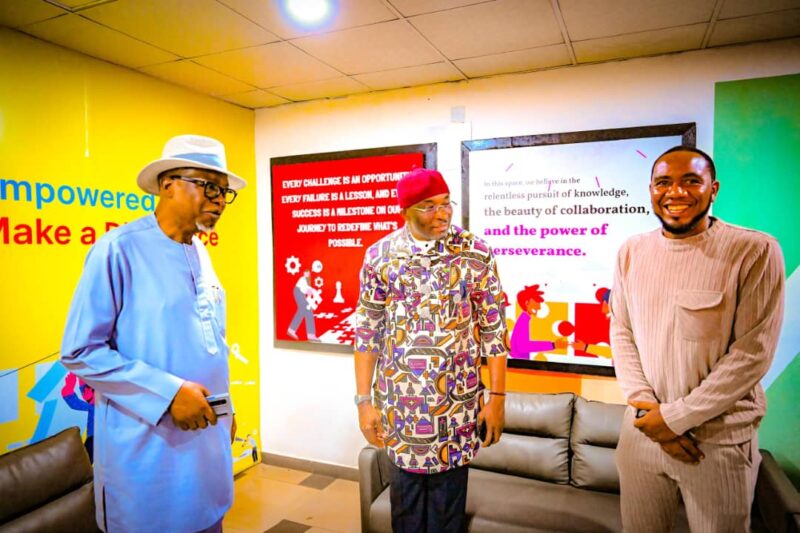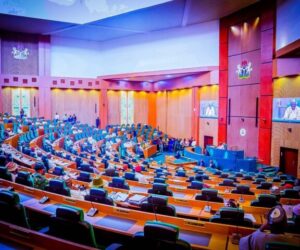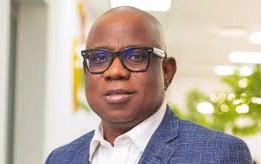1
Torkwase Nyiekaa
Deputy Speaker of the House of Representatives, Rt. Hon. Benjamin Okezie Kalu, PhD, CFR, has expressed readiness to collaborate with Bildup AI Learning to advance technology innovation and enhance human capital development in Nigeria.
In a statement signed by his Chief Press Secretary, Levinus Nwabughiogu, Kalu made the pledge during a visit to Bildup AI Learning Hub in Enugu on Saturday. The visit, undertaken alongside the House Majority Leader, Professor Julius Ihonvbere, and other lawmakers on the sidelines of the House Committee on Constitution Review Retreat, showcased the institution’s deployment of Artificial Intelligence (AI) to deliver transformative education to young Nigerians.
The Deputy Speaker emphasized that investing in human capacity remains vital to unlocking Nigeria’s global competitiveness, noting that the nation’s youth can become a major export of technological and digital services to the world.
He assured that his office would work closely with Bildup AI Learning to publicize its initiatives and attract the necessary backing from government agencies and development partners, saying such collaboration will foster innovation, entrepreneurship, and economic growth.
“We need to scale up what you are doing, and that’s where government support becomes essential. We will advocate for you in the Ministries of Education and Science and Technology,” Kalu said. “There are many NGOs looking for credible platforms to invest in, and we will partner with you to make that happen. This is not about politics, it’s about progress. Human capital remains one of Nigeria’s greatest resources.”
The Deputy Speaker praised the institution’s commitment to equipping young Nigerians with AI and digital skills, aligning with President Bola Tinubu’s Renewed Hope Agenda which places youth empowerment at its core.
“All over the world, Nigerians are making their mark through the power of innovation,” Kalu continued. “We must move from exporting goods to exporting services powered by our intellect. Imagine our youths sitting here in Nigeria but providing IT services to global companies like Oracle, Facebook, or Instagram, earning foreign exchange simply by leveraging their skills. That’s the future we must build.”
Encouraging the trainees to stay focused and innovative, Kalu described them as “disruptors” driving a new wave of productivity and transformation. He further proposed integrating AI-based learning models such as Bildup into constituency projects nationwide to expand access to affordable and quality education.
“Bildup has simplified learning, making it both accessible and affordable. Lawmakers should consider adopting this model in their constituencies to train thousands of young people. Human capacity development must be a priority, and I’m committed to supporting initiatives like this that empower our youth,” he added.
Earlier, the Chief Executive Officer (CEO) of Bildup AI Learning, Mr. Chibuike Aguene, highlighted the innovation’s potential to revolutionize education in Nigeria and Africa by providing students with equal access to world-class learning.
“What we’ve built is Africa’s first indigenous AI-powered educational platform capable of interacting with students just like a human teacher,” Aguene explained. “Some schools already use it, and results show significant improvement in learning outcomes. One student who prepared for JAMB using Bildup scored 97 in Mathematics after just two weeks of study.”
According to him, the AI system personalizes teaching and learning, effectively reducing the teacher-student ratio from 1:50 to 1:1 while complementing, not replacing, teachers. “We designed this entirely in-house here in the South East, demonstrating that local innovation can drive Africa’s future,” he said.
Aguene added that Bildup AI also provides a marketplace where graduates of its programmes can be discovered by local and international employers, thereby connecting Nigeria’s growing tech talent to global opportunities.
He concluded that the platform represents “a new dawn for education in Africa,” ensuring that technology becomes a bridge, not a barrier, to quality learning.








